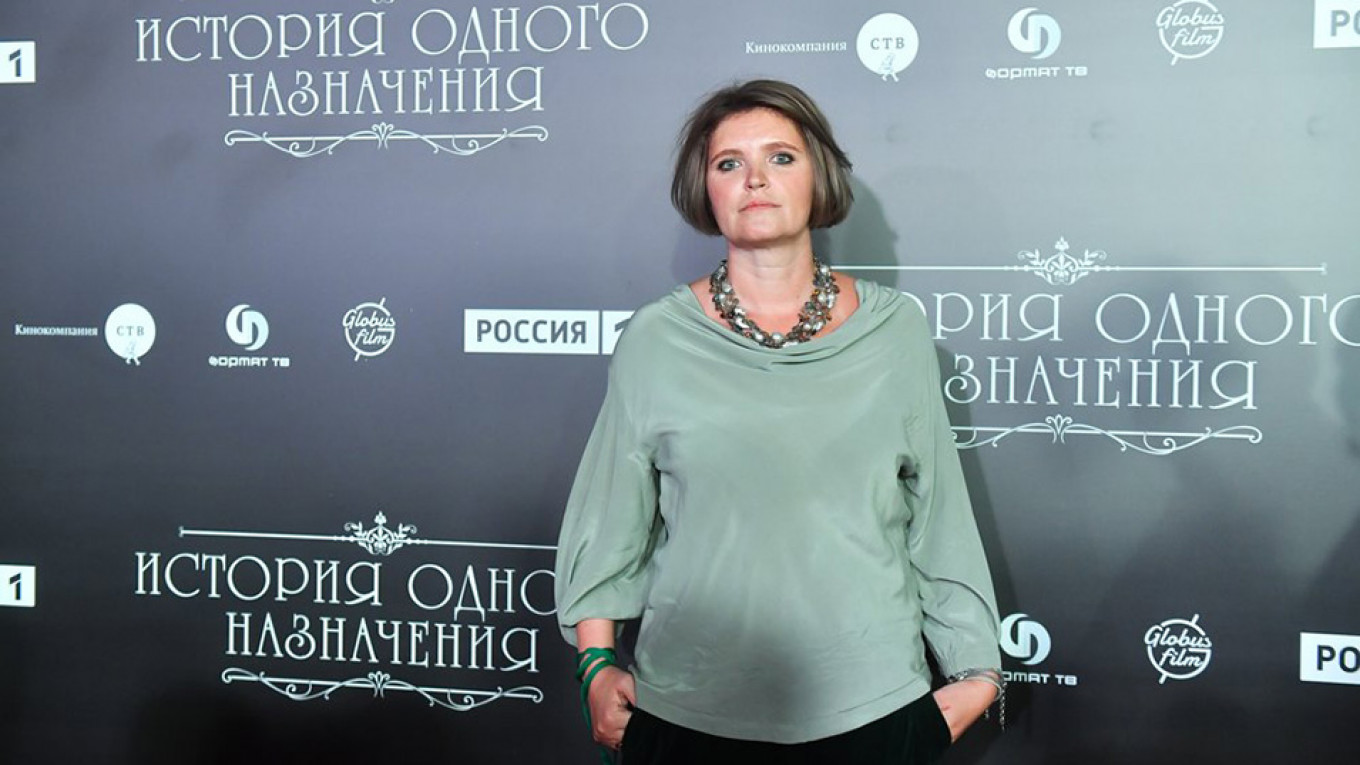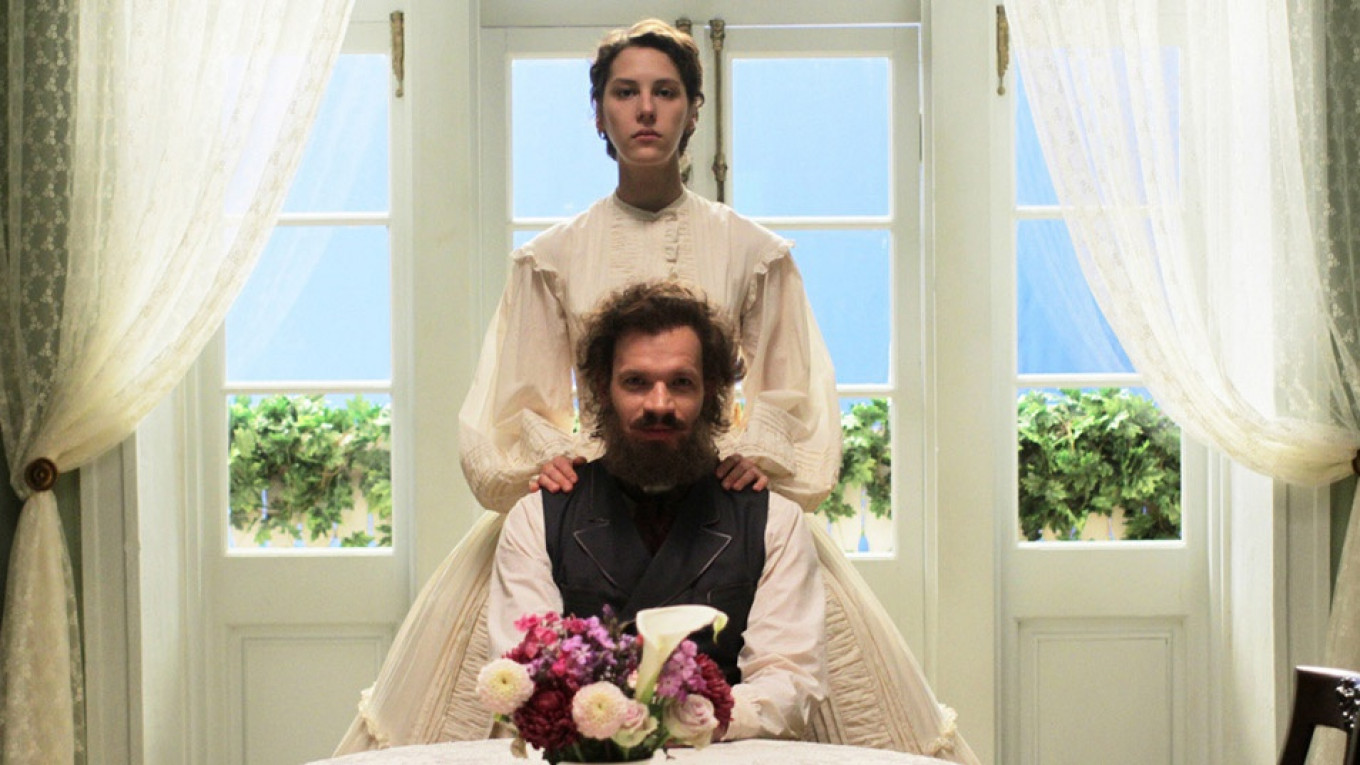Several weeks ago a new Russian film was released in theaters across the country, “The Story of an Appointment.” Directed by Avdotia Smirnova, a writer, screenwriter and television personality known for being, with writer Tatiana Tolstaya, one half of the “School for Scandal” show, the film tells a story, based on fact, that took place in 1866 in a garrison outside Tula.
It begins in Moscow, where a dissolute young officer, Kolokoltsev, charming and vaguely idealistic in the manner of the times, is confronted by his father, a general of the old school — the kind with a steel plate for a spine and an exaggerated sense of Duty and Honor and other qualities written with capital letters — over an incident involving champagne and an elephant. The young man, living under the shadow of his older brother, who died heroically in some unidentified way, decides to go off to a garrison outside the capital to make his father proud. On the way, he meets Count Leo Tolstoy and then visits the Tolstoy estate where he gets to know the large, eccentric, neurotic Tolstoy family, with dozens of little children running about, Tolstoy’s good-intentioned but poorly executed attempts at modernization, snippy competition between his practical, exasperated wife and her sister, who is engaged to Tolstoy’s brother, who has a Roma mistress and children he can’t quite give up…
Meanwhile, the garrison is run by a humorless, rule-loving Pole, who somehow doesn’t quite notice the constant disappearance of funds, but does make his rag-tag band of so-called soldiers march about the mud and poke bayonets into stuffed sacks with faces painted on them. Kolokoltsev and the Pole are in constant conflict, mediated by the higher-standing officer in Tula, a friend of Kolokoltsev’s family who is willing to accept any amount of corruption and idiocy to keep the status quo. But when the long-suffering butt of the regiment’s hazing — the regimental scribe, who has been called upon to hide the pilfering of regimental funds and is dreamily in love with a local peasant girl — breaks a law, everyone — absolutely everyone — gets sucked into a tragic drama. There is no happy ending.
You could look at the film as a study in psychological dramas: a young man trying to earn his undemonstrative father’s affection and respect; a great writer with grand, lofty ideas who should listen more to his intelligent, practical wife; a sensitive boy scapegoated by powerful men; a girl from the countryside, in love with someone who promises to take her away from it all. But everyone who saw it — and even those who didn’t see it — understood the film as a tale about Russia today. That is all that they agree on. Their opinions, fights, interviews, counter-interviews and social media posts run to nearly 100 pages.

At the Republic news office, all the journalists who saw it had such wildly different opinions that the editors just let each one write up a review. It was, they said, obviously about Russia today. It was about the uselessness of fighting for change in Russia, where all was and will forever be mud, corruption, and brutality. No, it was about the crimes of the liberal intelligentsia, whose calls for mutiny and attempts to improve the lives of their fellow countrymen lead to nothing but death, destruction and sorrow. The warrant officer was a hipster; Tolstoy was an effete intellectual; and the generals were, as they ever are, generals. No, it was a Russophobic picture of Russia. No, it was a defense of the powers that be. Not at all, it was really about how Alexei Navalny called on people to protest and young men and women are now languishing in jail because of him. Or not.
All of this was complicated by a delicious little fact of Smirnova’s personal life: she is married to Anatoly Chubais, one of the kingpins of reform in the 1990s, who provided financing and acted as one of the film’s producers. This fact kept coming up in interviews, which led Smirnova to quote something her husband once asked Pyotr Aven, another government reformer of those years, about a hypothetical dichotomy: “Don’t you think that the Russian people are choosing differently than we are in this dichotomy? For them the homeland is more important than freedom.” But that, she said, was distorted by a disreputable, dishonest journalist Whose Name Shall Never Cross Her Lips (Andrei Loshak), who said about Chubais: “He stated that for him the state is more important than freedom.”
Chubais’ statement — pick any one you want — outraged dozens of writers and intellectuals and people of conscience, since it’s easy to support the state when you head an organization that was funded by the state and then became private, which made you richer than Croesus and besides, How Dare He?
A famous human rights activist hadn’t seen the film but she objected in the strongest terms to Smirnova’s face, which was just wrong when she was talking to journalists — and her manner — condescending and somehow like a prayer-book waving Orthodox Christian — and if she thinks mercy is such an important message of the Gospels, where was she in the 1990s, I ask you? Well?
But Smirnova’s unfortunate face was quickly forgotten as the rest of the chattering classes went happily down the rabbit hole of the 1990s, bringing into the discussion Georgian nationalism, fate and freedom, the philosopher Alexei Losev, Vladimir Putin, Boris Yeltsin, drunkenness, and everything that is wrong with Russia everywhere and always, which is either the people or the leaders or the stars or none of the above or all of the above.
The only thing they did not drag into the discussion was Ukrainian Autocephaly, but I may have simply missed that.
In the end, writer Yuri Saprykin had to take on the role of the Good Dad to come in and calm the kids down. He pointed out that the fight about the film is really the battle of two conflicting views of Russia. One is the static view: Russia has underlying cultural and historical qualities that never change, no matter what it seems like on the outside, and these unchanging and immutable qualities will always determine and color everything else. This is good when they are called spiritual values and bad when they are called a genetically programed slave mentality. The other side has the dynamic view that Russian culture and history are flexible and can be changed, given a good plan and proper execution.
The film critics (readers, viewers, audiences), who are themselves adherents of one or the other view, saw in the film the battle of these two views, which is already grounds for verbal fistfights, but the level of emotion went off the scales because it seemed that one of the country’s greatest reformers — who clearly believed that Russia could be transformed, given the right plan, good execution, and enough money from the IMF — now appears to have joined the Nothing Will Ever Change camp, and everyone feels deceived and cheated, especially now that he’s rich and they’re not.
Well, Saprykin didn’t write exactly that. But he did write exactly this: “The film “The Story of an Appointment’ that began all this, like every major work of art, allows for a multitude of interpretations. It seems to some that it’s about the utter impossibility of change, a state of being that cannot be budged by carrot or stick, while it seems to others (like me, for example) to say that stasis and dynamism are all made up of myriad personal actions, determined by only individual, personal decisions — your choice, here and now.”
On the other hand, maybe it’s just a movie. Go see it.
A Message from The Moscow Times:
Dear readers,
We are facing unprecedented challenges. Russia's Prosecutor General's Office has designated The Moscow Times as an "undesirable" organization, criminalizing our work and putting our staff at risk of prosecution. This follows our earlier unjust labeling as a "foreign agent."
These actions are direct attempts to silence independent journalism in Russia. The authorities claim our work "discredits the decisions of the Russian leadership." We see things differently: we strive to provide accurate, unbiased reporting on Russia.
We, the journalists of The Moscow Times, refuse to be silenced. But to continue our work, we need your help.
Your support, no matter how small, makes a world of difference. If you can, please support us monthly starting from just $2. It's quick to set up, and every contribution makes a significant impact.
By supporting The Moscow Times, you're defending open, independent journalism in the face of repression. Thank you for standing with us.
Remind me later.







